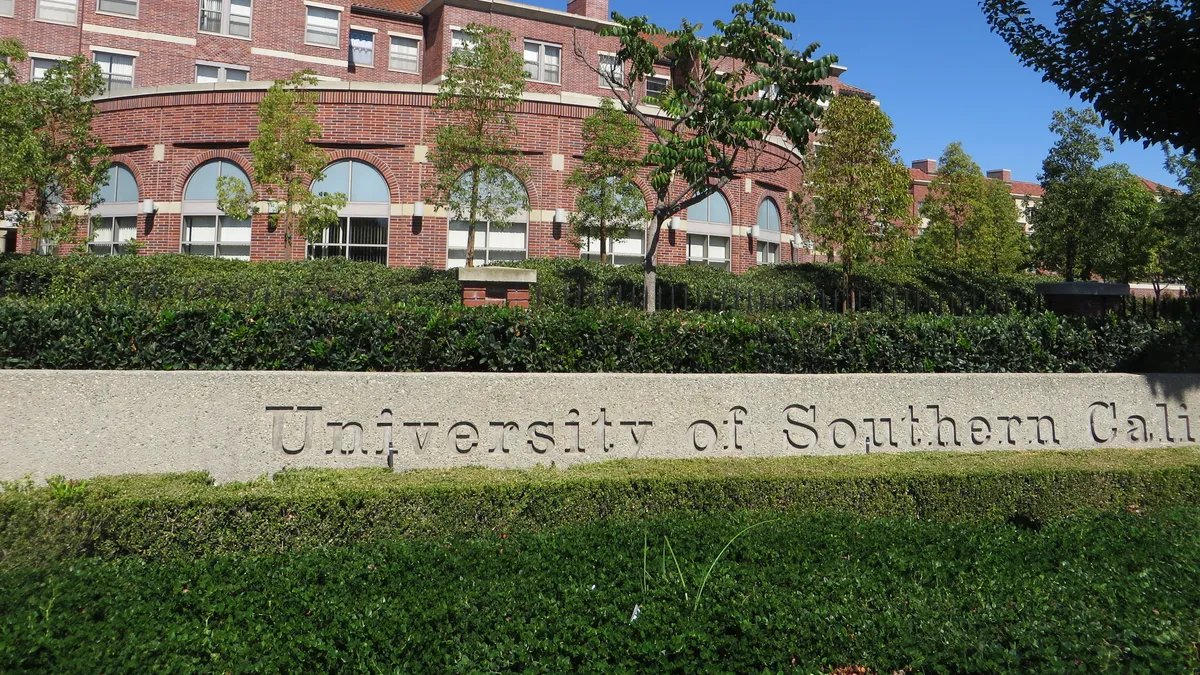Dive Brief:
- A California appeals court last week ruled that the University of Southern California (USC) must give students accused of sexual misconduct who face severe penalties the opportunity to question their accusers and other witnesses during a hearing in front of a neutral factfinder.
- The case centers on an expelled USC student who the university determined violated its sexual misconduct rules by allegedly raping another student who was too drunk to consent. However, the three-member panel of judges vacated the university's finding because it determined the USC's system for investigating sexual misconduct was unfair.
- The court criticized USC's single-investigator model, in which the Title IX investigator interviews witnesses and imposes discipline. The court wrote the system of a "single individual acting as investigator, prosecutor, factfinder and sentencer, is incompatible with adversarial questioning designed to uncover the truth."
Dive Insight:
The California ruling is aligned with two critical components of Education Secretary Betsy DeVos' proposed overhaul to Title IX: eliminating the single-investigator model and guaranteeing cross-examinations with the accused and their accuser.
The proposed rule, which is out for public comment until Jan. 28, has sparked outrage from victims' rights advocates and other groups who say it could discourage sexual assault survivors from coming forward. As of Friday morning, the rule has received more than 52,000 comments.
DeVos defended the proposed changes in a November op-ed for The Washington Post, arguing they would ensure final determinations were fair to both parties.
"Having outcomes overturned and relitigated because of process concerns — which has happened dozens of times in recent years — can be counterproductive to survivors," DeVos wrote. "This is why unbiased decision-makers need to objectively consider the testimony of both parties and other available evidence before reaching conclusions about what happened and what to do about it."
More than 300 accused students have filed lawsuits regarding Title IX investigations, and dozens have prevailed in their claims. The decision out of California is just the latest ruling from one of those lawsuits that has given more rights to students accused of sexual misconduct.
In September, for example, a federal judge ordered the University of Michigan to give a student accused of rape the opportunity to cross-examine his accuser and other witnesses, citing a similar ruling in a case involving the University of Cincinnati.
However, the ruling stopped short of guaranteeing the student the right to cross-examine his accuser himself, instead allowing him to use a representative on his behalf.
That's similar to the Ed Department's proposed rules, which say cross-examination can be carried out by the student's advisor or attorney. Even so, this has also caused concern among victims' rights advocates who worry sexual assault survivors will be retraumatized through courtroom-style questioning.
"I don't think we should have these bulldog attorneys tearing the accuser apart," Katherine McGerald, the executive director of victims' advocacy group SurvJustice, told Education Dive in November. "She's not on trial. He's not on trial. But they're giving it a very trial-like feeling."
Opponents of the Title IX changes contend it would turn college campuses into courtrooms, a role for which they're ill-equipped. For one, some smaller or cash-strapped institutions may not be able to easily comply with the standards the proposed rules lay out.
This could lead some colleges to push students toward informal resolutions such as no-contact orders, counseling or mediation, The Atlantic reported. Advocates worry that this, too, could reduce the number of victims who filed claims and warn they could be retraumatized if they end up pushed into hashing things out with their attacker or harasser.















